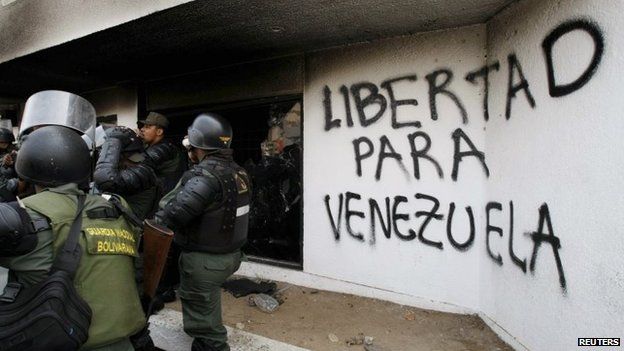What lies behind the protests in Venezuela?
- Published

A wave of anti-government demonstrations - the largest in a decade - has been sweeping through Venezuela since early February. The BBC's Irene Caselli in Caracas takes a closer look at the recent unrest.
What triggered the protests?
The protests began in early February in the western states of Tachira and Merida when students demanded increased security after a female student alleged she had been the victim of an attempted rape. Venezuela has the fifth highest murder rate in the world, and crime is rife in many urban centres.
The students also complained about record inflation (official figures suggest yearly inflation in December 2013 stood at 56.2%) and shortages of basic food items.
The protests in Tachira turned violent, triggering the arrest of several students, which in turn led to demonstrations in Caracas calling for their release.
The protests in Caracas started on 12 February and turned deadly when three people were shot by gunmen following a largely peaceful march that same day. There have been many demonstrations since then, varying in size from small gatherings to large rallies.
Who is protesting?
Students were the first to protest, but they were soon joined by hardliners from within the umbrella opposition group Table for Democratic Unity (MUD). Leopoldo Lopez, a former mayor and political maverick, and Maria Corina Machado, an MP, are the main political figures in the movement.
After the detention of hundreds of protesters and accusations that the security forces used excessive force, a more moderate wing of the opposition also took to the streets.
According to many observers and opposition leader Henrique Capriles, the protests are made up of a middle-class majority, with middle-class concerns.
What do the protesters want?
At first, their main demand was for increased security. But they have since broadened their demands to include the release of all those detained in previous protests, and economic changes to curb high inflation and alleviate shortages of some staples.
Many demonstrators say the government is beyond change and demand President Nicolas Maduro's resignation.
What does the government say?
The government accuses the opposition of trying to stage a coup with backing from the United States and has arrested a number of opposition leaders on charges of inciting violence.
It has drawn parallels between the protests and a brief coup that took place against Hugo Chavez in 2002. President Maduro has called the protesters "fascists".
Who is behind the violence?
Both protesters and members of the security forces have died in the violence which has marred some of the protests.
The opposition has accused pro-government motorcycle gangs, as well as the security forces, of shooting live rounds into opposition crowds.
The government says "fascists" are behind the violence, instigating riots and encouraging people to erect barricades. A number of motorcyclists have been decapitated by barbed wire strung across residential streets to hinder the security forces.
Will the protests create change?
These are not only the largest protests since Mr Maduro took office, they are also Venezuela's biggest protests in over a decade, spreading to other cities beyond Caracas.
However, so far they seem confined mainly, though not exclusively, to the middle class. The government's popularity remains high amid its working-class voters, who gave it a further boost in local elections in December.
Mr Capriles has said that as long as the protests do not spread to a wider sector of society, it is unlikely there will be any change.